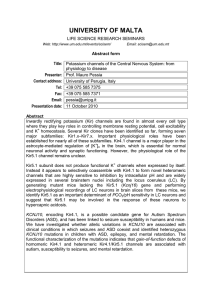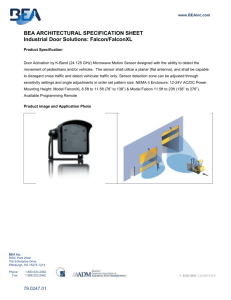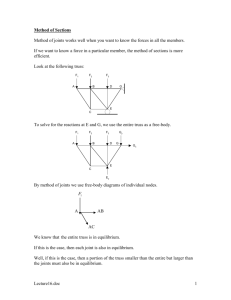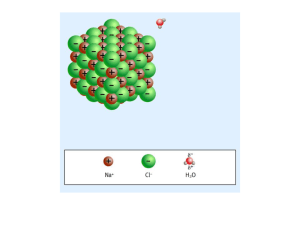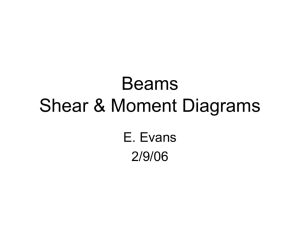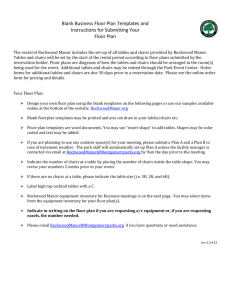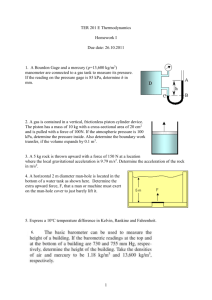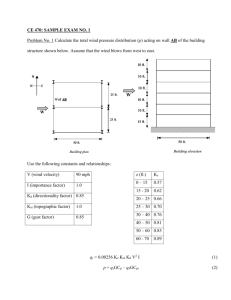DOC) · F01 Exam #2 Solutions
advertisement
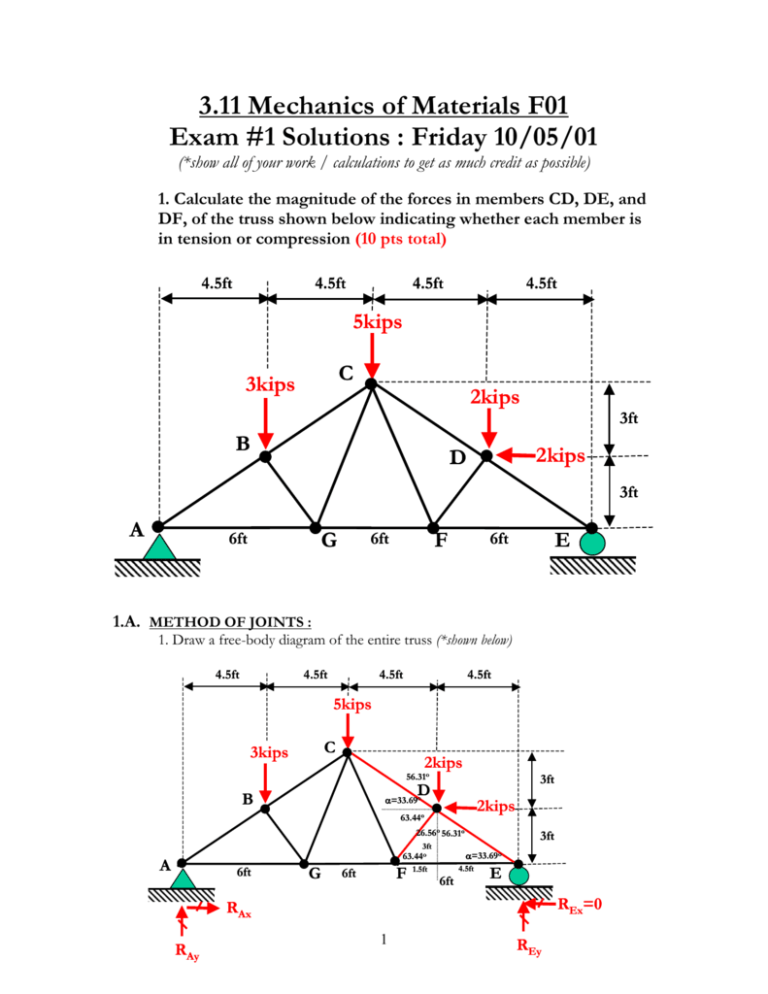
3.11 Mechanics of Materials F01 Exam #1 Solutions : Friday 10/05/01 (*show all of your work / calculations to get as much credit as possible) 1. Calculate the magnitude of the forces in members CD, DE, and DF, of the truss shown below indicating whether each member is in tension or compression (10 pts total) 4.5ft 4.5ft 4.5ft 4.5ft 5kips C 3kips 2kips B 3ft 2kips D 3ft A G 6ft F 6ft E 6ft 1.A. METHOD OF JOINTS : 1. Draw a free-body diagram of the entire truss (*shown below) 4.5ft 4.5ft 4.5ft 4.5ft 5kips C 3kips 2kips 56.31o 3ft D =33.69 B o 2kips 63.44o 26.56o 56.31o 3ft A 6ft G F 6ft 1.5ft 3ft =33.69o 63.44o 6ft 4.5ft E REx=0 RAx RAy 1 REy 2. Determine support reactions using the equations of static equilibrium Fx=0, Fy=0, Mxy=0 (CCW+, CW-) : By definition : REx=0 kips Fx=0= RAx+REx-2 RAx=2 kips MA=0= -3(4.5)-5(4.5)(2)-2(4.5)(3)+2(3)+REy(4.5)(4) MA=0= -13.5-45-27+6+ REy18 MA=0= -79.5+ REy18 REy=79.5/18 REy=4.417 kips Fy=0=-3-5-2+REy+RAy= -10+4.417+RAy RAy=5.583 kips (3 pts for determining reaction forces) 3. Identify a joint where you know the maximum amount of forces (e.g. a support with two members). Start at Joint E. 4. Draw a free-body diagram of the joint and determine whether forces are compressive or tensile. We know that there has to be a force in the downwards ydirection counteracting the upwards reaction force at the roller. Hence, FDE must be in compression, which also indictaes that FFE must be in tension to counteract FDEx. FDE FDEy FDEx =33.69o E FFE 4.417kips 5. Write and solve equations of static equilibrium* for diagram drawn in step 4. From geometry : FDEx=FDEcos=0.832FDE FDEy=FDEsin=0.5546FDE where : 2 Fy=0=4.417-FDEy=4.417-0.5546FDE FDE=7.963 kips (COMPRESSION) Ans. (3 pts for determining FDE) 6. Move to an adjacent joint and repeat steps 4-5 until entire truss is solved Move to Joint D and choose directions arbitrarily. FCDy Joint D 2kips FCD 56.31o FCDx FFDx =33.69o =33.69o 63.44o FFD =26.56o =56.31o FFDy F From geometry : 2kips FDEx FDE DEy FDEx=FDEcos0.832FDEkips FDEy=FDEsin=0.5546FDEkips FFDx=FFDcos=0.4472FFD FFDy=FFDsin= 0.8943FFD FCDx=FCDcos= 0.832FCD FCDy=FCDsin=0.5546FCD Fx=0=-2-FDEx+FCDx+FFDx=-2-+0.832FCD+0.4472FFD Fx=0=-8.625+0.832FCD+0.4472FFD (1) Fy=0=-2-FCDy+FFDy+FDEy=-2-0.5546FCD+0.8943FFD Fy=0=2.4162-0.5546FCD+0.8943FFD (2) Hence, we have two equations and two unknowns : Solve eq. (1) for FCD=8.625-0.4472FFD/0.832=10.366-0.5375FFD Plug into eq. (1) into eq. (2) and solve for FCD: 0=2.4162-0.5546[10.366-0.5375FFD]+0.8943FFD 0=2.4162-5.749+0.298FFD+0.8943FFD 0=-3.3328+1.1923FFD FFD=2.79 kips (COMPRESSION) Ans. 3 Plug into eq. (1) : 0=-8.625+0.832FCD+0.4472(2.79) FCD=8.866 kips (COMPRESSION) Ans. (4 pts for determining FFD and FCD) 2. The stress state for a linear elastic isotropic material is shown on the following page (E=45kPa and =0.35). a) What is the magnitude and direction of the largest normal strain? b) What is the magnitude of the largest shear strain? What plane does it take place in? (10 pts) y kPa kPa kPa kPa kPa x O• kPa z 4 x 8 y 2 z 5 2.A. The stress pseudovector is : yz 2 xz 4 xy 1 Hooke's Law for a linear elastic, isotropic material under multiaxial loading in matrix form is : x y z 1/ E yz xz xy 1 . 1 . . . . 1 . . . . . . . x 0 0 0 y 0 0 0 z 2(1 ) 0 0 yz . 2(1 ) 0 xz . . 2(1 ) xy 0 0 0 which corresponds to the following set of six equations : x x / E y / E z / E y x / E y / E z / E z x / E y / E z / E yz 2(1 ) yz / E xz 2(1 ) xz / E xy 2(1 ) xy / E Substituting in the given numerical values yields : x 8 / 45 0.35 * 2 / 45 0.35 * 5 / 45 0.177 0.0155 0.038 0.2305 y 0.35 * 8 / 45 2 / 45 0.35 * 5 / 45 0.06 0.044 0.0388 0.0548 z 0.35 * 8 / 45 0.35 * 2 / 45 5 / 45 0.0622 0.015 0.111 0.1583 yz 2(1 0.35) * 2 / 45 0.12 xz 2(1 0.35) * 4 / 45 0.24 xy 2(1 0.35) *1/ 45 0.06 a) The largest normal strain is x=-0.23 (compressive). Ans. b) The largest shear strain is xz=-0.24 Ans. 5 3. Calculate the force needed to compress the steel bar shown below to Lo/2 if the bar is simultaneously heated up by 50oC (E=200GPa, L=1210-6 /oC, Lo=0.5m, Ao=0.05m2). (10 pts) F Lo y Ao x 3A. =F/Ao=E=F/EAo TOTAL=THERMAL+=+LT-F/EAo TOTAL=L/Lo=-0.5Lo/Lo=-0.5 -0.5=+LT- F/EAo solve for : F=[0.5+LT]EAo substitute in numerical values : F=[0.5+(1210-6/oC*50 oC)]200GPa*0.05m2 F=5.006GN Ans. 4. Define the following words in one to two sentences : (2pts each=10 pts) a) statically indeterminate : a structure which has more variables than number of equations of static equilibrium; hence, additional equations are needed to solve the entire structure (i.e. geometric compatibility, constitutive eqs., etc.) b) membrane stresses : tensile stresses in the wall of a thin walled spherical pressure vessel tangential to the curved surface of the vessel, = c) thermal shock : failure or fracture of a materials or structure due to stresses induced by thermal expansion d) hydrostatic stress : a stress state with three normal, equal stresses and no shear stresses, =x=y=z, xy=xz=yz=0 e) moment lever arm : the perpendicular distance from the point of interest to the line of action of the applied force 6
